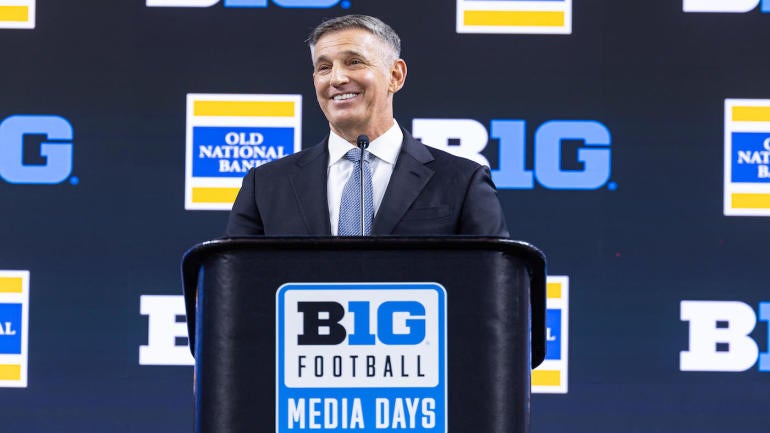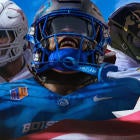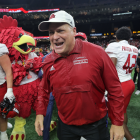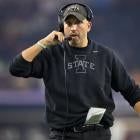
INDIANAPOLIS -- The man overseeing the largest conference in FBS history doesn't particularly enjoy projecting that strength. Big Ten commissioner Tony Petitti is a Harvard Law school graduate who has shepherded the conference through its largest growth spurt in its storied history.
It was different to see new schools fly in from the West Coast to fill their slots during Big Ten Media Days this week. Those schools -- Oregon, Washington, USC and UCLA -- made forever decisions in the nation's richest league.
There isn't any going back. Not that they would want to.
Petitti is in charge of the Big Ten at perhaps its most powerful. Along with the SEC, his league -- which boasts reigning national champion Michigan -- will command the majority of the College Football Playoff spots in the new, expanded 12-team format that debuts this season.
More than 25 years ago, Petitti helped create the system before us as an ABC TV executive. Fourteen months into the job as the Big Ten's seventh commissioner, Petitti sat down with CBS Sports to talk about issues of the day and his influence on them.
Big Ten schools are due to make $75 million annually in media rights revenue alone. Petitti's schools are in a position to fully fund whatever is required out of the House v. NCAA settlement that is due to be formally submitted on Friday.
The footprint of the league is so vast that, in the offseason, the Big Ten became even more tradition-laded. It picked up two Heisman winners at one school (USC). You better believe the exploits of Caleb Williams (2023) and Reggie Bush (2005; reinstated by Heisman Trust in April 2024) will be integrated into conference lore on the Big Ten Network.
What you'll read here is perhaps an early hint at expanding the 12-team bracket. After this season, commissioners will revisit a potential format change beginning in 2026 when the new TV contract begins.
Entering his second season, Petitti seemed more relaxed at media days. How could he not be? His league has never been richer. Its football is dominant considering the Big Ten now houses half of last year's CFP field (Washington, Michigan).
The season may start with at least three teams in top 10 (Oregon, Ohio State, Penn State).
Let the nationwide games begin.
This interview has been edited for brevity.
CBS Sports: You have stressed the desire for more, better games late in the season. How does that impact when the commissioners take up structure and format of the playoff beginning for the 2026 season?
Tony Petitti: Our schedule gives us the first step to that. One, we're playing a better schedule. There's more big matchups. Second, the 12-team format will do some of that as well. More teams alive later in the season. We owe it all to our colleagues. We all feel the same way. Let's see how this format works with the regular season and see where we go from there.
CBS Sports: You have the biggest conference. You, theoretically, have the biggest games at least in terms of volume. Is that reason to address the size of the bracket?
Petitti: We really just need to see what the results of playing the Big Ten schedule look like in terms of access to championship and how factors weigh in whether it be strength of schedule, nonconference.
CBS Sports: The House long-form settlement proposal is due to be filed Friday. We've seen other lawsuits -- frivolous or not -- be filed outside those particular cases. Is there concern over further legal liability for the NCAA and schools?
Petitti: I've never taken the position that the threat of other things happening is a reason not to so something. At some point you have to choose a path. Is this the best path to stability? Is this doing enough right now to address a lot of the concerns we're having in college athletics? I think the answer turned out to be yes. That's why we did it. It doesn't mean the settlement is curing all the other issues. At the end of the day, this was a very critical group of cases that were settled out. They do provide a pretty clear pathway system.
CBS Sports: What about help from Congress? What's the timeline now in an election year?
Petitti: There's a [Congressional] break in August. I'm not going to predict any timelines. I think it's too difficult to do. I will say that I've had positive conversations with members of Congress in terms of providing direct assistance to student-athletes in addition to the educational benefits, in addition to true NIL. I think that message has been received.
CBS Sports: Are there any specific travel protocols in the expanded Big Ten for the minor sports?
Petitti: It's minimizing the coast-to-coast [travel] as best you can. Figuring out ways to schedule it. It's not every sport played by every school. It's just different.
We'll put in play, and like I've been saying, hopefully we get most of it right. We've got to be honest about getting feedback, so if something needs to be changed, we'll change it.
CBS Sports: What is your feeling about strength of schedule and possibility of 9-3 teams getting into the playoff?
Petitti: I think about that all the time. I start off from a place where I think the definition of success to compete for a championship is too high. It shouldn't be 11-1 or 12-0. There's no sport that qualifies its postseason based on close to a perfect record.
We've done that for a long time in college football. We had so few teams competing for it … The BCS was a two-team system. These last 10 years there has been a four-team system. That's a very small [sample size].
Even if you take 70 schools roughly in the Autonomy Five (now Power Four), with four teams you didn't have a system that guaranteed all the conference champions … It was time to do something different. Now we have 12. We still have to figure out. I don't think it's going to be a number much bigger than that, but how do you figure out who those 12 are?
In fairness to the [selection] committee, it's a really difficult job to compare teams that don't have head-to-head or common opponents.
CBS Sports: Are automatic qualifiers dead for you in the next negotiation?
Petitti: No, not at all. I get back how does this format work, learning from it and what's the best way to deliver the best postseason.
CBS Sports: This may be a moot question, but do you expect all your schools to fully fund revenue sharing?
Petitti: Big Ten schools have all made significant investments in college athletics. I don't have any reason to think how that would be any different. But there is individual discretion at an institutional level.
CBS Sports: How do you feel about stratification of sports? Ohio State is out there saying it might not offer scholarships to lower-end minor sports.
Petitti: I think the system will evolve. This is unique. You go campus to campus and find very different priorities in sports. How they choose to invest in those sports, what they choose to emphasize has always been a local decision.
CBS Sports: Putting your TV executive hat on, what is the state of the game? The CFP contract is signed. There has been conference consolidation.
Petitti: Not even putting my TV hat on, just thinking about sports in general. I don't think there is anything healthier than college football. It drives a tremendous engagement on campus. By any metric, it's just really, really strong. I think there's still room to make it better. I think this year is going to make it better.
It's going to be cool to see a playoff in a cold-weather venue potentially.
CBS Sports: You're in a great place. Your conference is in a great place. Do you have any agenda items?
Petitti: The key is getting a lot right as we move into this new paradigm. I feel a real responsibility from the conference office to provide stability to the coaches and administrators and student-athletes that we promised them.
CBS Sports: There's one way to make some of this uncertainty go away -- collectively bargain with players. That doesn't necessarily mean they're employees, but some of the administrators think it's an inevitability.
Petitti: The ink isn't even dry on what this is. We've got to figure out how we implement this system. It does not mean that for certain reasons it might have to change again. I think it's the right way to operate, worry about what's coming around the corner.
CBS Sports: You just happen to be at 18 members, but how big can any conference get?
Petitti: I don't want to speculate. Eighteen, it's a lot for us to do right now, especially in the environment [we're in] right now.
















